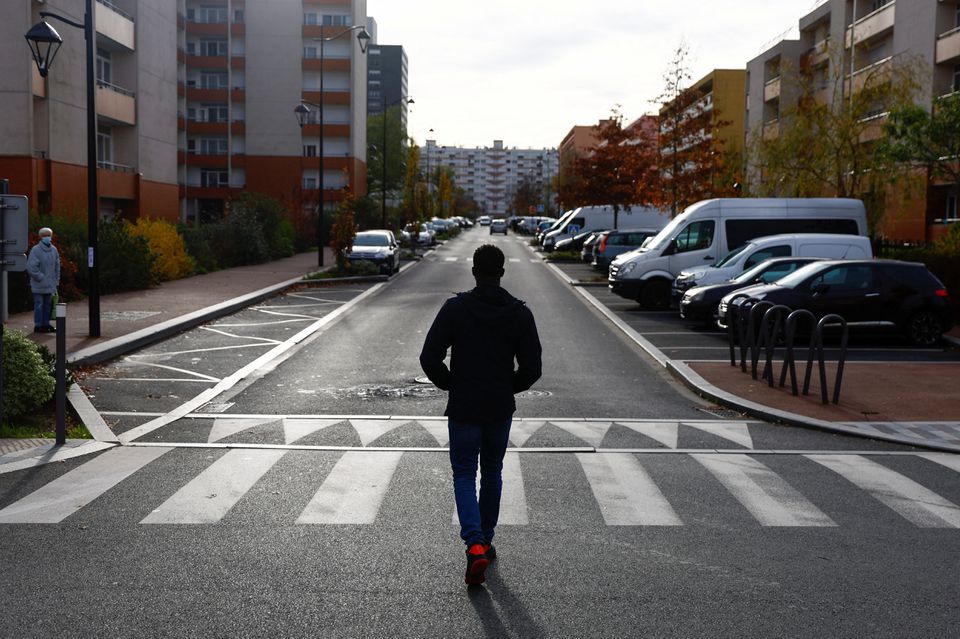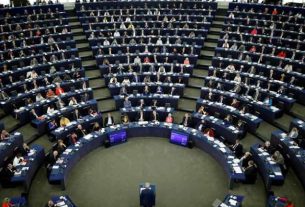EPINAY-SOUS-SENART, France, Dec 6 (Reuters) – Mohamed Assam went to buy groceries at a supermarket close to his home near Paris one April afternoon in 2020. By the time he returned, he had incurred more than 900 euros in fines for nine different infractions without once, he said, coming into contact with a police officer.
The 27-year-old from the Paris suburb of Epinay-sous-Senart said he learned of the fines about a week later, when he received notifications in the post. His alleged offences, which he is contesting, include violating COVID-19 lockdown rules and lacking correct headlights on his quad bike, according to the notices he received from an interior ministry agency reviewed by Reuters.
“It was a surprise, a bad surprise,” said Assam. He now owes thousands of euros in total for fines accrued since 2019, including late payment fees, according to Assam and his lawyer.
French President Emmanuel Macron – facing criticism from rivals who accuse him of being soft on drug dealers and other offenders – has implemented a string of policies aimed at curbing urban crime. Those include greater authority for police to issue fines – a power police have seized upon.
Nationwide, the number of non-traffic related fines has grown by more than six times – to 1.54 million last year from 240,000 in 2018, according to the interior ministry agency for fines. In 2020, when the country underwent multiple COVID-19 lockdowns, the number surpassed 2 million.
Proponents say the fines reduce the burden on the justice system by keeping minor infractions out of court. Critics say the penalties allow police to dispense sanctions at their own discretion, without proper accountability. Some lawyers and rights advocates say this power has resulted in police targeting poorer people and those from ethnic minority backgrounds, leaving some people saddled with hefty debts.
French laws strictly limit the collection of data about an individual’s race or ethnicity, which makes it difficult to determine exactly how the fines impact ethnic minority groups, but the census does collect some figures on immigrants, based on place of birth and nationality. A Reuters review of census-related and some fine-related police data from across France reveals that police have fined people at higher rates in areas with the heaviest percentages of immigrants.
“There is systemic discrimination,” said Alice Achache, a lawyer representing some Paris residents who are challenging fines.
President Macron has previously said there is no “systemic racism” in the French police. His office declined to comment for this report, as did the national police. The interior ministry did not respond to questions. Police in other countries such as the United States and Britain have faced accusations of over-policing and over-sanctioning of minority communities.
In Epinay-sous-Senart, Assam’s town, a Reuters review of data from more than two years of police reports recording incidents involving at least one fine found more than 80% of those incidents occurred in two adjacent neighborhoods where residents say many ethnic minority families live. Of the 478 police reports that recorded fines from April 2018 to July 2020, 403 were from that part of town, according to the local police data, which Reuters obtained via a freedom of information request. The vast majority of the people fined had Arab or African surnames, the data showed.
More than one-third of Epinay-sous-Senart residents ages 25 to 54 are of non-European immigrant background, as are more than half of the town’s children, according to 2017 census data compiled by France Strategie, a government think tank.
The heavy concentration of fines in parts of the town where immigrants live fits a pattern that has played out across France, according to the Reuters review. Police issued 58 COVID-related fines per 1,000 population in the five Paris districts with the highest concentration of residents with non-European backgrounds, based on France Strategie’s figures. That is about 40% higher than the rate of other areas, where police issued almost 42 fines per 1,000 people.
Nationwide, the rate of pandemic-related fines in areas where official statistics show a high concentration of immigrants was 54% higher than in other areas between mid March and mid May 2020 during the country’s first nationwide lockdown.
Police also sometimes issue fines remotely and fine the same people repeatedly, including on occasion multiple times within minutes, according to fine recipients and defense lawyers. The burden of these remote and repeat fines falls heavily on minorities, these people say, adding to their suspicion police are targeting ethnic groups.
Issuing fines remotely is a breach of police procedures for non-traffic infractions, according to several legal specialists. Philippe Astruc, the public prosecutor in Rennes, runs the office responsible for processing fines that individuals nationwide dispute. He said police shouldn’t issue a fine without stopping the rule breaker, except in the case of certain road-related rule breaches.
Despite the rules, some lawyers representing fine recipients say remote fining occurs. Achache, the Paris lawyer, said that police know the names of individuals because they regularly conduct identity checks and recipients sometimes don’t even know they’re being fined at the time of the alleged infraction, she said.
Proving bias in fining practices is difficult, some scholars say. Other factors that could explain the geographical disparity in fine rates, sociologists said, include greater concentration of police patrols or higher crime rates in certain areas.
Aline Daillere, a sociologist researching policing at Paris Saclay University, said the Reuters analysis shows “certain categories of the population are very frequently fined,” mostly young men from poorer neighborhoods who are – or are perceived to be – minorities. One possible explanation, she said, is that police are targeting minority populations. But it’s not possible to prove discrimination, she said, without data showing that police treat people of varying ethnicities differently. Such data doesn’t exist.
Augustin Dumas, the municipal police chief of Epinay-sous-Senart until the summer of 2020, denied targeting a particular area or section of the population, saying police responded to complaints by inhabitants. “If someone is doing something wrong, you need to act,” said Dumas, now an elected official in a nearby town.
Macron, who came to power five years ago on a centrist platform and was re-elected this year, has toughened his stance on law and order amid stiff competition from the right. Rights advocates say his government has chipped away at civil liberties while giving greater powers to authorities, such as the ability to close mosques without trial.
The expanded police powers include the right to issue on-the-spot fines. Several new finable offences have been added since 2020, including drug use and loitering in building hallways. The government is seeking to add more police fines as part of a broader security bill. Lawmakers are due to vote on the legislation this month.
The proposed expansion of fines is aimed at providing “efficiency and simplicity,” Interior Minister Gerald Darmanin told the upper house of parliament in October. During another debate in the lower house in November, Darmanin denied racial profiling by police in issuing fines.
The new fines the government is proposing, which include penalties for offences like graffiti and stealing petrol, would be marked on a person’s criminal record, unlike fines for minor infractions such as making noise, littering or breaking lockdown restrictions. Either way, what troubles some critics is the lack of judicial oversight.
Justice is being taken out of the courtroom and conducted on the streets, without safeguards such as right to a defense, said Daillere, the sociologist. “If we don’t go in front of a judge, what stops a police officer from giving out a sanction even if there isn’t an infraction?”





